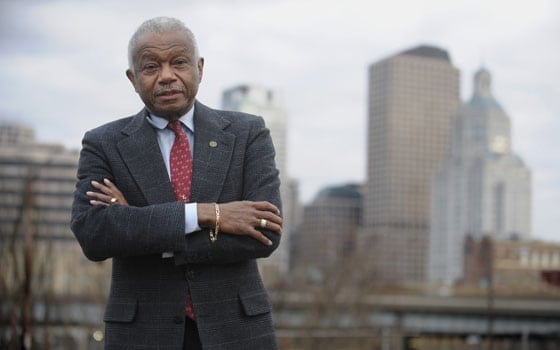

HARTFORD, Conn. – When the confetti stopped flying and the cheers died down on Election Night 1981, Mayor-elect Thirman Milner looked over Hartford’s skyline and one half-jesting thought filled his mind.
“What have I done?’”
Milner, a descendant of slaves and Native Americans who was raised by a widowed mother on welfare, had just done something historic: he’d become the first black man elected mayor of a New England city.
Now, as Hartford struggles to retain its tax base and its current mayor awaits trial on corruption charges, the soft-spoken Democratic trailblazer is increasingly seen as the city’s conscience, too.
Milner, 76, who kicks off a series of book-signing events this weekend for his newly published autobiography, was the sixth of seven siblings raised in Hartford’s hardscrabble North End. Not far away, an elementary school now bears his name.
Milner has rubbed elbows over the decades with everyone from Nelson Mandela and Martin Luther King Jr. — and attended his 1963 “I Have a Dream” speech — to Jimmy Carter, Archbishop Desmond Tutu and President Barack Obama.
Some of those events are chronicled in his memoir, “Up from Slavery: A History from Slavery to City Hall in New England.”
The 104-page autobiography, which he wrote without ghostwriters, is a folksy blend of political and personal recollections. It concludes with his attendance at the 2008 Democratic National Convention in Denver.
There, as a VIP guest of longtime friend U.S. Rep. John Larson D-Conn., the man elected as his region’s first black mayor witnessed the nomination of a man later elected as his nation’s first black president.
But Milner’s proudest moments are not those get-togethers, his many state and national honors or his time as a state senator and representative.
Milner’s family is never far from his mind, including the hardworking mother who raised seven children after the death of her husband, Milner’s father, from illnesses related to his World War I service.
“The proudest thing in my life was not becoming mayor myself, but the fact that it gave my mother a chance to see her youngest son become mayor of the city where she grew up,” Milner said on a recent afternoon.
Today, current Hartford Mayor Eddie Perez Jr. awaits trial this spring on charges of attempted extortion and taking bribes, allegations which he vehemently denies.
Race relations in the city also were strained when a white officer fatally shot an unarmed black teenager in 2005 and, this winter, was exonerated of manslaughter charges by an all-white jury.
Those incidents keep Milner’s phone ringing — often with people seeking his opinion, his predictions and the support that the even-keeled Milner offers in a manner free of the bombast of many big-city politicians.
Milner was mayor from 1981 to 1987, and ran again unsuccessfully in 2007 to draw attention to concerns over performance in Hartford’s schools.
In fact, one of his greatest joys is meeting regularly with students at Thirman L. Milner Elementary School, who invariably are surprised that he does not ride in a limo, does not live in a mansion and does not own the school named for him.
“What I tell them is, ‘I lived in this neighborhood, too. We were on welfare, too. There’s no real difference between you and me and you can accomplish what you want if you work hard,’” Milner said.
Others got that message from Milner long ago. Daryl Roberts, also raised by a single mother in the North End, was a rookie Hartford police officer when Milner became mayor. Now, Roberts is the police chief.
“What Thirman Milner did was erase the labels and stereotypes for people like me. He was a great example that your possibilities didn’t have to be limited because of your skin color,” Roberts said.
Even many onetime political rivals say they consider him a friend and a public servant from whom to learn valuable lessons.
Former Hartford councilman Michael McGarry, Milner’s Republican opponent for mayor in 1981, recalls a pre-election debate in which McGarry warned of budget shortfalls and Milner spoke of his hopes for a myriad of social programs.
“After it was all over, I looked him in the eye and said, ‘Thirman, how can you promise this stuff — we have no money!’ and with a twinkle in his eye, he said, ‘Mike, I didn’t promise to DO those things, I promised to work TOWARD them.’
“I laughed and said, ‘I learned something from you today.’ A young pup learned a lesson from an old pro,” McGarry said.
Associated Press






